

Unmoved mover. First philosophy[edit] Celestial spheres[edit] Final cause and efficient cause[edit] Simplicius argues that the first unmoved mover is a cause not only in the sense of being a final cause—which everyone in his day, as in ours, would accept—but also in the sense of being an efficient cause (1360. 24ff.), and his master Ammonius wrote a whole book defending the thesis (ibid. 1363. 8-10).
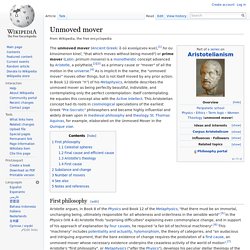
Simplicius's arguments include citations of Plato's views in the Timaeus—evidence not relevant to the debate unless one happens to believe in the essential harmony of Plato and Aristotle—and inferences from approving remarks which Aristotle makes about the role of Nous in Anaxagoras, which require a good deal of reading between the lines. But he does point out rightly that the unmoved mover fits the definition of an efficient cause—'whence the first source of change or rest' (Phys. Aristotle's theology[edit] It is clear then that there is neither place, nor void, nor time, outside the heaven. Euclid. "Euclid" is the anglicized version of the Greek name Εὐκλείδης, meaning "Good Glory".[4] Life Little is known about Euclid's life, as there are only a handful of references to him.
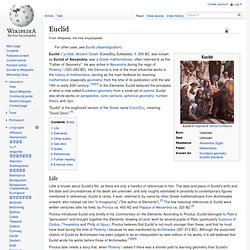
The date and place of Euclid's birth and the date and circumstances of his death are unknown, and only roughly estimated in proximity to contemporary figures mentioned in references. Euclid is rarely, if ever, referred to by name by other Greek mathematicians from Archimedes onward, who instead call him "ό στοιχειώτης" ("the author of Elements").[5] The few historical references to Euclid were written centuries after he lived, by Proclus ca. 450 AD and Pappus of Alexandria ca. 320 AD.[6] Proclus later retells a story that, when Ptolemy I asked if there was a shorter path to learning geometry than Euclid's Elements, "Euclid replied there is no royal road to geometry A detailed biography of Euclid is given by Arabian authors, mentioning, for example, a birth town of Tyre.
Elements Other works See also Notes References. John Stuart Mill. John Stuart Mill, FRSE (20 May 1806 – 8 May 1873) was an English philosopher, political economist and civil servant.
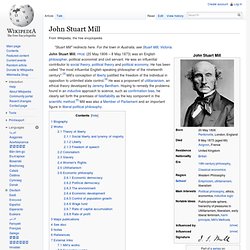
He was an influential contributor to social theory, political theory and political economy. He has been called "the most influential English-speaking philosopher of the nineteenth century".[3] Mill's conception of liberty justified the freedom of the individual in opposition to unlimited state control.[4] He was a proponent of utilitarianism, an ethical theory developed by Jeremy Bentham. Hoping to remedy the problems found in an inductive approach to science, such as confirmation bias, he clearly set forth the premises of falsifiability as the key component in the scientific method.[5] Mill was also a Member of Parliament and an important figure in liberal political philosophy.
Freedom of thought. Overview[edit] Without freedom of thought there can be no such thing as wisdom & no such thing as publick liberty without freedom of speech, Benjamin Franklin, 1722. 'Freedom of thought' is the precursor and progenitor of -and thus is closely linked to- other liberties: freedom of religion, freedom of speech, and freedom of expression.
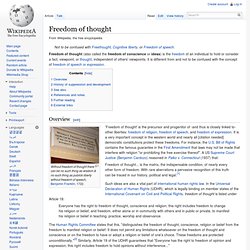
It is a very important concept in the western world and nearly all [citation needed] democratic constitutions protect these freedoms. For instance, the U.S. Logical atomism. Logical atomism is a philosophical belief that originated in the early 20th century with the development of analytic philosophy.
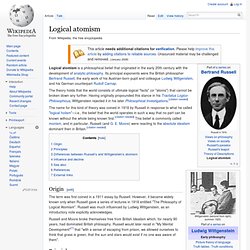
Its principal exponents were the British philosopher Bertrand Russell, the early work of his Austrian-born pupil and colleague Ludwig Wittgenstein, and his German counterpart Rudolf Carnap. The theory holds that the world consists of ultimate logical "facts" (or "atoms") that cannot be broken down any further. Having originally propounded this stance in his Tractatus Logico-Philosophicus, Wittgenstein rejected it in his later Philosophical Investigations. [citation needed] The name for this kind of theory was coined in 1918 by Russell in response to what he called "logical holism"—i.e., the belief that the world operates in such a way that no part can be known without the whole being known first.
Bertrand Russell Wikipedia. Russell led the British "revolt against idealism" in the early 20th century.[58] He is considered one of the founders of analytic philosophy along with his predecessor Gottlob Frege, colleague G.
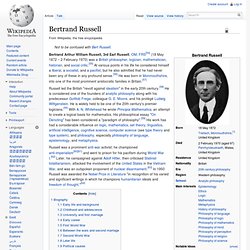
E. Moore, and his protégé Ludwig Wittgenstein. He is widely held to be one of the 20th century's premier logicians.[55] With A. N. Whitehead he wrote Principia Mathematica, an attempt to create a logical basis for mathematics. Russell was a prominent anti-war activist; he championed anti-imperialism[60][61] and went to prison for his pacifism during World War I.[62] Later, he campaigned against Adolf Hitler, then criticised Stalinist totalitarianism, attacked the involvement of the United States in the Vietnam War, and was an outspoken proponent of nuclear disarmament.[63] In 1950 Russell was awarded the Nobel Prize in Literature "in recognition of his varied and significant writings in which he champions humanitarian ideals and freedom of thought Biography Early life and background Early career.